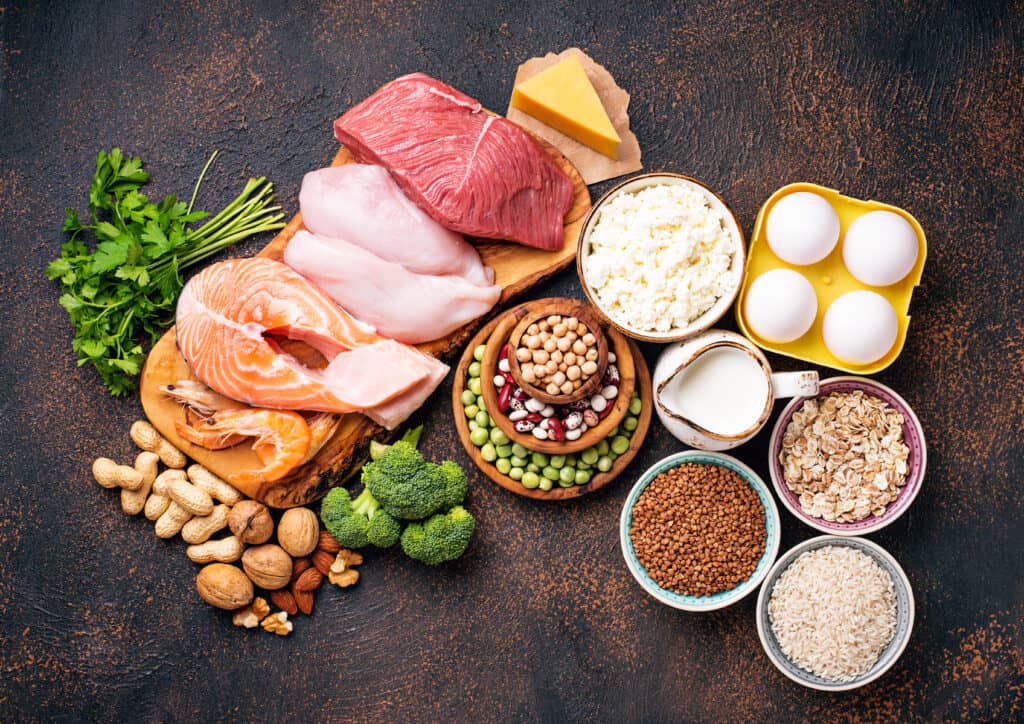
Discover 5 Easy Steps to Hit Your Protein Goals for Building Muscle!
Whether you’re a bodybuilder, looking to lose weight, or aiming to tone up, follow these 5 expert tips from a leading sports nutritionist to meet your protein needs for muscle gain.

Meeting your protein needs is essential for muscle gain, and it should be combined with weight training.
Remember to include the following text:
For both athletes and those focused on weight loss, the idea of building muscle can seem larger than life. The most crucial element is resistance training, which should be done at least twice a week. Additionally, incorporate regular cardiovascular exercise at varying intensity levels. Make sure to have a recovery day and get plenty of quality sleep. This allows the muscles to rest and receive the signalling needed to build muscle, or at the very least, not lose muscle during weight loss.
The nutritional ingredients needed to support muscle growth, especially protein, have been a popular topic lately. Some people, like bodybuilders, are consuming very high amounts of protein, while others are trying to consume more moderate amounts of protein to keep their calorie intake in check. The right amount of protein probably lies somewhere in between.
Research has identified key strategies for athletes and dieters to implement for muscle growth through protein.
1. Make sure to consume protein in the morning.
In the morning, when you wake up, your protein levels are low and your body is more likely to break down muscle (catabolism) than build it up (anabolism). To prevent muscle breakdown from exceeding muscle synthesis, it’s important to eat protein-rich meals, especially if you’re exercising. Simple ways to add protein to your breakfast include eating hard-boiled eggs, Greek yogurt, or having a smoothie made with milk.
2. Make sure to include protein in each meal and spread it out evenly throughout the day.
As with other body tissues, muscles are in a continual state of flux – being built up, then broken down. Consuming evenly balanced meals at regular intervals facilitates more muscle synthesis compared to irregular or low-protein meals.
3. Remember to consume 20 grams of protein within 30 minutes after resistance training or intense exercise.
Researchers studying healthy men found that a 20-gram dose of protein after exercise was the most effective, with little to no additional benefit seen at higher protein doses. After intense workouts, muscles require a source of carbohydrates, so it’s important to focus on a balanced recovery snack that contains both carbohydrates and protein, such as a fruit and yogurt smoothie.
4. Choose a high-quality source of protein.
Whey protein is easy to digest and contains all the essential amino acids necessary for muscle growth. In addition to these benefits, milk is known to be a good source of the amino acid leucine, which is highly recommended for muscle protein synthesis. Other sources that contain this amino acid include tuna fish, soybeans, lentils, beef, salmon, and more. Soy protein is also considered a high-quality protein source.
5. While reducing calories for weight loss, it’s important to maintain a high protein intake.
The IDEAL (Improving Diet, Exercise, and Lifestyle) for Women Study showed that women who followed a reduced-calorie diet were able to both gain muscle mass andy consuming more protein and dairy. Women who consumed 30% of their calories from a high-protein diet and 1,700 mg of calcium improved muscle mass, compared to women who consumed a reduced protein diet at 15% of calories andcium, and lost muscle mass. All study participants were prescribed an exercise program with 5 days of aerobic exercise and 2 days of light resistance exercise. The group consuming a high-protein, dairy-rich diet also significantly increased their strength. lose body fat b 1,100 mg of calcium improved muscle mass, compared to women who consumed a reduced protein diet at 15% of calories and 1,100 mg of calcium, and lost muscle mass. All study participants were prescribed an exercise program with 5 days of aerobic exercise and 2 days of light resistance exercise. The group consuming a high-protein, dairy-rich diet also significantly increased their strength.
How much protein should you consume?
For active individuals and those aiming to reduce body fat, it can be helpful to consume a higher amount of protein than the recommended dietary allowance (RDA) and participate in resistance training exercises at least twice a week to maintain or build muscle mass. For healthy individuals without kidney disease, it is suggested to aim for 0.6-0.8 grams of protein per pound of body weight. This translates to 90-120 grams of protein per day for a person weighing 150 pounds (68 kg). Many people already consume this amount through their regular meals and snacks, so there may not be a need to rely on protein powder, shakes, and supplements.
If you are vegan, vegetarian, or have dietary restrictions, protein supplements may be helpful.
- 1 large egg (6 g)
- 1 cup cooked oatmeal (6 g)
- 6-ounces Greek yogurt (18 g)
- 3-ounces chicken breast (25 g)
- 1/2 cup cottage cheese (12 g)
- 1 cup black bean soup (13 g)
- 1 cup whole wheat pasta (8 g)
- 1-ounce almonds (6 g)
- ½ cup roasted broccoli (3 g)












I think that is among the so much vital info for
me. And i’m happy reading ylur article. But should statement on some
basic issues, The website style is wonderful, the articles is in point
of fact nice : D. Excellent activity, cheers https://Bandurart.mystrikingly.com
I think that is among the so much vital info for me. And i’m happy reading your
article. But should statement on some basic issues, The website style is wonderful, thee articles is in point of fact nice :
D. Excellent activity, cheers https://Bandurart.mystrikingly.com